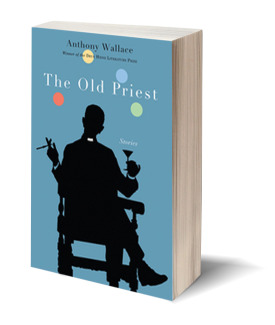The Old Priest
By Anthony Wallace
University of Pittsburgh Press |
 |
|---|
Reviewed by James Orbesen
Anyone who's gone to a casino before has probably heard to never bet against the house. The odds just aren't in your favor. But in Anthony Wallace's short story collection, The Old Priest, a collection of outsiders keeps trying to defy the odds. Set in and around casinos from the perspective of card sharks, dealers, and even a girl in a dog collar, everyone is trying to get a leg up and break lucky. However, the only break these characters can look forward to is the one between shifts. As a dealer in "Jack Frost" describes it:
Most of the time, in fact, I like to pretend I'm not here, think other thoughts, put my mind in other places, and I can do it, too, because after all these years I can deal a game of 21 in my sleep. Which is the only way a person should have to do a job like this, let me tell you.
Time stands still in most of these stories. Much like the interior of a casino, Wallace offers no clocks to tell you what happens when. Is it night or is it day? How much money has actually been lost? Wallace's characters are constantly finding themselves looking back and wondering where all the time has gone.
Where does it go, after all? Isn't that one of the sourest questions in life? You can quickly make the best laid plans, walk up to the table with an arm full of chips and think luck is on your side. That's the optimism of youth, thinking you can beat the house. Nevertheless, like gravity, the odds are always against you. That mountain of blue chips you've been nursing? Yeah, they're gone.
Wallace showcases how youth can transform in unexpected ways, leaving one stuck in place, chasing their tail. In "The City of Gold," a young girl in the sway of a lecherous older man is taken to New Mexico to make it in the expanding gambling trade:
As soon as we slept together he told me to quit the luncheonette and concentrate on my schoolwork. Sometimes, late at night, he liked to do my hair. He'd pick out my clothes, ask me about my friends, nodding approval or disapproval at what I told him. I thought he was a weirdo but I kept going back for more, I wasn't sure why except that I felt safe with him. At the same time the sex started getting rougher.
Spoken like a true gambler playing one more hand to dig her way out of a hole.
"Have You Seen This Girl" deals with quarrelsome relationships and a short documentary being filmed guerilla-style in a casino. Justin, the filmmaker, promotes his project with the energy of a younger man. Nevertheless, his ideas feel a bit stale, like a manuscript tucked away in a desk drawer for years.
Most of the footage is of Justin in his dealer's costume, going through his day, giving interviews, taking drugs, reciting Shelley and Keats. Then he becomes an obnoxious gambler in a plaid sportcoat who also happens to give interviews, take drugs, and recite Shelley and Keats. Howard says it's all about the transformation of experience, imaginative flights, things that turn unexpectedly into their opposites.
Both of these stories speak to the unexpected turns life can take, and Wallace uses the casino as a shorthand for all of life's chances and risks. This device, although repetitious, works in each story quite well. It isn't the cards in the characters' hands that are interesting. Instead, it's the cards dealt by fate; and no amount of time can change a bad hand.
Again and again, Wallace references time. In the title story, told in the second person, a narrator recounts his experiences with an aged priest. Though the two shared an intimate teacher/pupil relationship that has come to define the narrator, he cannot help but reflect and speculate that their time together was a bit sinister. There were compromising situations that seemed innocent at first. Plus, the perennial child abuse scandals of the Catholic Church bring long buried memories to the surface.
Still, because of their long, mutual history the narrator reflects on the youth of the old priest. Hailing from Boston, the priest and his friend, Itchy—who might have been his erstwhile lover—seem caught in a time loop of memory and storytelling. For the narrator (and in all the stories contained within Wallace's collection) understanding time and what it does to a person is essential.
To penetrate time you must go outside of time. Outside of time is the world of myth, of eternal and meaningful recurrence. Even as the old priest tells his anecdotes again and again they acquire substance, a kind of permanence or narrative integrity that goes beyond their literal level. No longer does the old priest as a young boy simply knock at Itchy's door; he eternally knocks at Itchy's door. Itchy, perhaps having just come from a fresh beating, eternally answers the door. This is a cool trick.
Like the clockless casinos, the individual tragedies that define these characters' lives are divorced from time. They happen over and over again, becoming more powerful and more influential. A small mistake becomes the neverending turning point of one's life. Time never stops, and no one can step outside of it.
While the sun rises and sets outside, inside the casino things stand still, frozen. Cards are dealt repeatedly. Sometimes you find yourself up and you pick up some slack. You might even end up with a few extra chips. In the end, however, the house always wins. Time always wins. This is what Wallace demonstrates with his stories that take the long view of history and shrugs, knowing that the odds are stacked against us.
